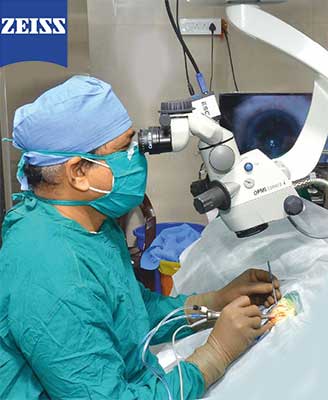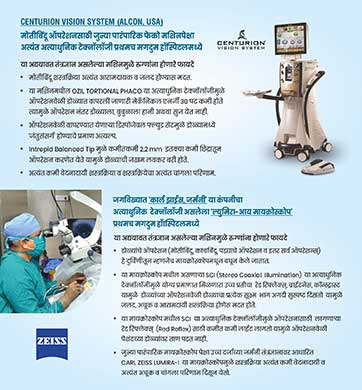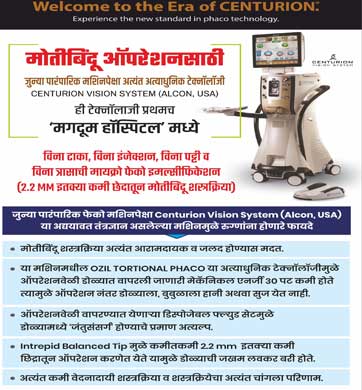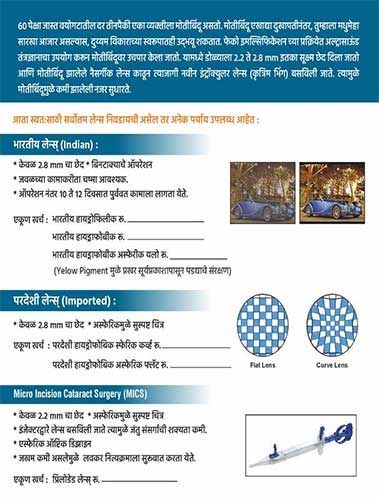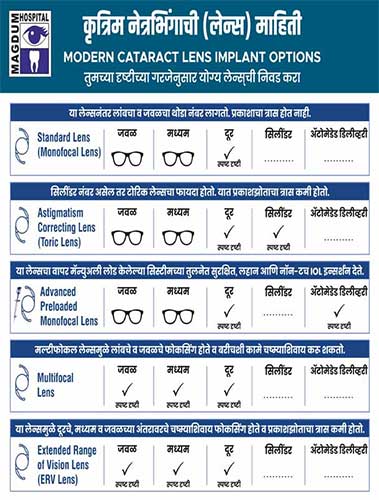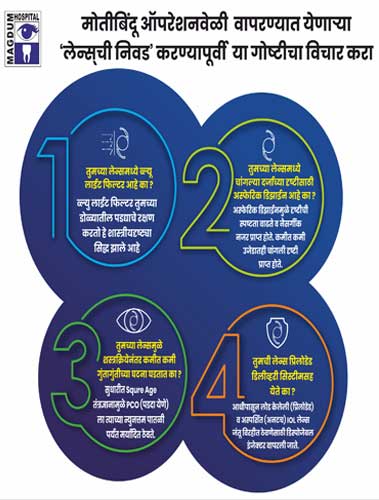
Mon - Fri : 10 am - 1:30 pm & 4 pm - 6:30 pm | Sat : 10 am- 1:30 pm | Sun – Closed
Book Appointment
+91 7720024466
At Magdum Hospital, we are dedicated to providing the Best Cataract Treatment in Ichalkaranji. With a team of highly skilled ophthalmologists, state-of-the-art technology, and a patient-first approach, we ensure that every individual receives world-class eye care in a compassionate and comfortable environment.

Symptoms of Cataract

Cloudy Vision

Sensitivity To Light

Diffuse Light

Colours Appear Faded

Double Vision In One Eye
Cataract Treatment
With availability of new advanced phaco systems, cataract treatment is a very comfortable and painless daycare process. It doesn’t require use of injection, suturing and bandage, enabling individual to start his/her routine activity within 15 days
No stitch
No patch
No injection
Return home within an hour of the procedure
Faster recovery and return to most of the normal activities within few days
Why Magdum Eye Hospital for Cataract Surgery
Quality
The devices and disposables used here are US FDA approved
Use of high end consumables
World best and scientifically proven intraocular lenses (IOLS)
High end phacoemulsifiers called CENTURION with OZIL technology, the topmost technology with advanced safety features from Alcon, USA
Zeiss Lumira I operating Microscope
Single use devices
Strict aseptic precautions
Advance operation theatre with lamellar air flow with hepa filter and air handling unit to minimize infection
Daily sterilization of OT
Weekly evaluation
Extensive pre-operative evaluation of the eye allows for safer surgery
Expert Cataract Eye Specialist in Ichalkaranji
Dr. Vijay Magdum
MBBS, DOMS, FCPS (MUMBAI)
Dr. Vijay Magdum is a highly qualified and experienced ophthalmologist with extensive expertise in the field of anterior segment surgery. He holds an MBBS degree and has pursued DOMS at the National Institute of Ophthalmology in Pune, where he received guidance from the esteemed Dr. Shreekant Kelkar. Dr. Magdum has also completed his FCPS from Sir JJ Hospital and Grant Medical College in Mumbai, under the guidance of the renowned Dr. T P Lahane.
With over two decades of experience as a general ophthalmologist, Dr. Magdum is an expert in phaco (cataract surgery), glaucoma treatment, and Lasik surgery. He has a deep understanding of the anterior segment of the eye and is known for his compassionate care and personalized treatment approach. Dr. Magdum's patients appreciate his attention to detail and his ability to explain complex medical procedures in an easy-to-understand manner.

Vision Restored | Frequently Asked Questions About Cataract Surgery
-
Q1. What is a cataract?
A cataract is the clouding of the eye's natural lens, which leads to blurred or impaired vision. Cataracts are most commonly caused by aging but can also result from factors like diabetes, eye injuries, or long-term steroid use.
-
Q2. What are the common symptoms of cataracts?
• Blurred or cloudy vision
• Sensitivity to light and glare|
• Difficulty seeing at night
• Colors appearing faded or yellowed
• Double vision in one eye
• Frequent changes in prescription glasses or contact lenses -
Q3. When should I consider cataract surgery?
Cataract surgery is typically recommended when the cataract begins to significantly interfere with your daily activities, such as reading, driving, or recognizing faces
-
Q4. How much does cataract surgery cost?
The cost of cataract surgery can vary depending on the type of procedure and intraocular lens (IOL) you choose. At Magdum Hospital, we offer affordable cataract treatment with various pricing options to suit your budget. We also accept most insurance plans. Please contact us for a detailed cost estimate.
-
Q5.How is cataract surgery performed?
Cataract surgery involves removing the clouded lens and replacing it with an artificial intraocular lens (IOL). The most common method is phacoemulsification, a procedure that uses ultrasound waves to break up the cataract before it’s removed. Laser-assisted surgery is also available for greater precision and quicker recovery.
-
Q6. Is cataract surgery painful?
Cataract surgery is generally painless. Local anesthesia (eye drops or an injection) is used to numb the eye, and you may feel slight pressure during the procedure. Most patients report little to no discomfort during or after surgery.
-
Q7. How long does cataract surgery take?
The surgery itself typically takes about 15 to 30 minutes. However, you should expect to spend a few hours at the hospital for pre-surgery preparations and post-surgery monitoring.
-
Q8. What is the recovery time after cataract surgery?
Recovery time is usually quick. Most patients experience improved vision within a day or two, though complete healing can take a few weeks. Your doctor will provide you with specific instructions on how to care for your eye after surgery to ensure a smooth recovery.
-
Q9. What is an intraocular lens (IOL), and how do I choose the right one?
An intraocular lens (IOL) is an artificial lens that replaces the eye's natural lens during cataract surgery. There are several types of IOLs available, including monofocal, multifocal, and toric lenses, each offering different benefits for vision correction. Your ophthalmologist will help you choose the lens best suited to your lifestyle and vision needs.
-
Q10. Can both eyes be treated at the same time?
Cataract surgery is typically performed on one eye at a time, with a gap of a few weeks between surgeries to allow for proper healing and assessment of the first eye before proceeding with the second.
-
Q11. Can both eyes be treated at the same time?
Cataract surgery is typically performed on one eye at a time, with a gap of a few weeks between surgeries to allow for proper healing and assessment of the first eye before proceeding with the second.
Check what our patients say about us!
Suraj Shetti
My mom's cataract surgery was done from Magdum Hospital. Dr Magdum is very calm and experienced. He explained the procedure nicely and addressed our queries with precision. Well planned pre and post surgery patient care and consultation. The procedure itself was painless and completed as per schedule. Hospital staff is well behaved and experienced. The documentation for my mediclaim insurance reimbursement was neat and clean. Thank you team Magdum Hospital.
Mandira Satvekar
My Grandmother's cataract surgery of both eyes done by Dr Magdum Sir with clear vision and without any complications. Dr.magdum sir and staff are very kind and helpful overall experience at the hospital was Amazing. The facility was friendly and kind with all latest technology . Thank you so much for all services. I'm strongly recommending MAGDUM HOSPITAL, ICHALKARANJI for all kind of eye problems and cataract surgery.
Pranav Baliphadi
My dad got his cataract surgery done in this hospital. The service and hospitality is great and doctors, staff were cooperative throughout this process, even they helped us with the documentation required for claiming the medical insurance.
Rupesh Patil
My Father's Cataract surgery went very well and smooth with no any pains. Cost of surgery is also comparatively cheaper. Magdum doctor and his staff are experienced and very helpful.
Sudarshan Vathare
Operation experience is very good... My father's both eye cataract operation successfully done by Dr. Magdum... Staffs are very cooperative.... All services are good
Suhas Mali
Dr. Vijay magdum is very co-operative . He is master in his skill. After Cataract operation, my Mother is feeling Good and regain her vision back in a short span of time . Hospital Staff is supportive. Hospital is maintained too neat & Clean.
Eye Treatments We Offer
